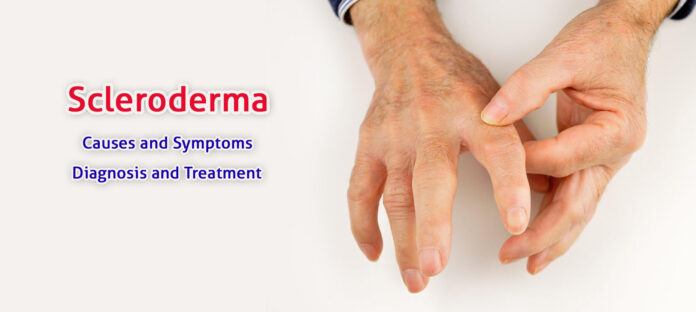Scleroderma is a rare autoimmune disease that causes the skin and connective tissues to become thickened and hardened. Here’s an overview of its symptoms, causes, treatment, and prevention:
Symptoms:
- Skin Changes: The hallmark symptom is the hardening and tightening of the skin, which can affect the hands, face, and other areas of the body. This can lead to a shiny appearance and difficulty moving affected areas.
- Raynaud’s Phenomenon: Many individuals with scleroderma experience Raynaud’s phenomenon, where the fingers and toes become numb and cold in response to cold temperatures or stress.
- Digestive Issues: Scleroderma can affect the digestive system, leading to symptoms such as difficulty swallowing, heartburn, and bloating.
- Joint Pain: Some people with scleroderma experience stiffness and pain in their joints.
- Organ Involvement: In severe cases, scleroderma can affect internal organs such as the lungs, heart, kidneys, and gastrointestinal tract, leading to potentially life-threatening complications.
Causes:
The exact cause of scleroderma is unknown, but it is believed to involve a combination of genetic, environmental, and immune system factors. It’s thought that an abnormal immune response triggers the production of excess collagen, leading to the characteristic thickening and hardening of tissues.
Treatment:
- Medications: Various medications may be used to manage symptoms and slow the progression of the disease. These may include immunosuppressants, corticosteroids, and drugs to help improve circulation.
- Physical Therapy: Physical therapy can help maintain mobility and flexibility, particularly in affected joints.
- Skin Care: Moisturizing the skin regularly can help alleviate discomfort associated with skin changes.
- Surgery: In some cases, surgery may be necessary to treat complications such as severe reflux or digital ulcers.
- Pulmonary Rehabilitation: For individuals with lung involvement, pulmonary rehabilitation programs can help improve breathing and overall lung function.
Prevention:
Since the exact cause of scleroderma is unknown, there are no specific prevention methods. However, managing risk factors such as smoking and maintaining a healthy lifestyle may help reduce the risk of developing complications associated with the disease.
It’s important for individuals with scleroderma to work closely with their healthcare providers to manage symptoms and monitor for complications. Early detection and treatment can help improve outcomes and quality of life for those affected by this condition.
































